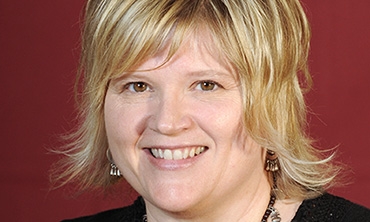“Politics with Beauvoir: Freedom in the Encounter,” is the latest book by Lori Jo Marso, the Doris Zemurray Stone Professor of Modern Literary and Historical Studies and professor of political science.
A fan of the French feminist, philosopher and writer for more than three decades, Marso has longed to delve into Beauvoir’s political thought.
The timing couldn’t be better. As she writes in the book, “I am finishing up this project at what seems to be an especially dark moment for our planet, for non-whites, queers, immigrants, women (in particular for “unbecoming” women), the poor, and everyone marked by difference. Beauvoir’s political thinking inspires my own political commitment to keep fighting, keep moving, keep living, and with others to keep making space for freedom.”
Marso is the author and editor of several books, including “W Stands for Women: How the George W. Bush Presidency Shaped a New Politics of Gender,” and “Feminist Thinkers and the Demands of Femininity: The Lives and Work of Intellectual Women.”
She recently recorded a podcast for the New Books Network.
The Chronicle caught up with Marso to ask about her latest book.
What drew you to your topic?
I was studying at the London School of Economics in 1986 when Simone de Beauvoir died. I came across a display of her books, bought one that day, devoured it and was hooked. I've been reading and teaching her work ever since and have long wanted to write a book on her politics. Many books are about her philosophy and her literary works, and I have learned a great deal from this scholarship. What I wanted to explore, however, is the way that Beauvoir's alliances with many of her contemporaries, including the African-American author Richard Wright and the Martinique-born Frantz Fanon, contributed to political work and political writing that simultaneously theorizes feminism, anti-racism and anti-colonial politics.
What did you learn about Beauvoir while writing the book that you didn't know before?
I learned that the way Beauvoir thinks about freedom - that it is only experienced with others and never alone - also infused the way she lived her life. She thought and acted with others, and was always in relationship not only with friends, but also allies, and even enemies.
Will you be incorporating the book into your classes?
I don't teach my own writing because students are exposed to my perspective throughout each of my courses just by the fact that I am in the conversation with them on a daily basis. They don't need to read me as well as listen to me! But I do know that other colleagues will be teaching this book, and I look forward to hearing their students’ reactions.
Are there any misconceptions about Beauvoir?
So many! I spend much of the introduction of the book talking about the many ways that Beauvoir has been appropriated in rather misleading ways-- as a liberal, as a communist, as a man-hater, as a lesbian. “The Second Sex” is one of the most quoted books ever, but also the one that everyone thinks they know even though they have never read it.
What do you hope a reader takes away from reading it?
I hope readers will, with me, take up Beauvoir's way of engaging in politics, which is to fight for freedom for all -not just for the individual -but as a bulwark against oppression of all kinds.
How relevant is Beauvoir's approach to feminism today, especially during the anti-feminist Trump regime?
Beauvoir's is the most relevant form of feminism for today. Her politics focuses our attention not just on the lives and needs of women, but on all who are subject to oppression: non-white peoples, the poor, refugees, and those disproportionately affected by climate change and the ravages of the capitalist market.
